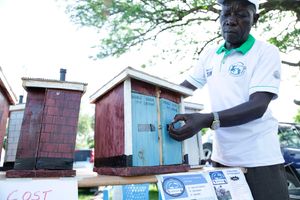Why Kwale continues to grapple with open defecation

Kwale Health Executive Francis Gwama.
What you need to know:
- According to the Centre for Disease Control and Prevention, diarrhoeal diseases account for one in nine child deaths worldwide, making diarrhoea the second leading cause of death among children under the age of five.
Kwale County is still grappling with open defecation despite efforts and campaigns to improve sanitation in the devolved unit.
According to Health Executive Francis Gwama, more than half of the residents in the coastal county are still not using toilets, exposing them to water-borne diseases such as cholera, diarrhoea, typhoid, amoebiasis, Hepatitis A, among others
“By last year, the number of residents using toilets had risen from 31 per cent to 42 per cent. Although this is an improvement, we have still identified that people are not building latrines and toilets in their homes, or they have built but are not using them,” he said.
Mr Gwama told Healthy Nation that campaigns are still ongoing in partnership with the Kenya Sanitation Alliance to ensure that more residents embrace sanitation both in their homes and businesses through construction of latrines and toilets.
For instance, residents are now being advised to adopt community-led proper sanitation, where they do not have to use concrete, rather make use of locally available materials to build latrines.
According to the executive, the county cannot build toilets and sanitation blocks for all the villages.
“The truth is that the county does not have the capacity of building toilets for every household. But through the community-led initiative, for instance, three neighbours can contribute materials and build a grass-thatched latrine,” said Mr Gwama.
He explained that open defecation not only pollutes the environment but also contaminates water sources that, in turn, cause waterborne diseases like diarrhoea, bilharzia and cholera.
According to the Centre for Disease Control and Prevention, diarrhoeal diseases account for one in nine child deaths worldwide, making diarrhoea the second leading cause of death among children under the age of five.
The health official also raised alarm over the increasing number of flying toilets in the county, where people relieve themselves in plastic bags and water bottles, disposing them of in open places, including near markets.
“I have personally observed this, especially in Kwale town, which is not even a slum. We encourage residents to be responsible because proper sanitation is also key for their good health,” he said.
Healthy Nation has learned that some of the residents use flying toilets and defecate in open areas because of their squatter status and cultural beliefs.
“There are people who do not have rights to the land they are living in. They have been instructed not to build permanent houses and dig any boreholes or latrines. That means that they can only relieve themselves in bushes,” said a field health officer who did not want to be named.
At the same time, cultural practices have been blamed for the open defecation crisis, where locals believe it is taboo to share toilets with their relatives.
“This happens in the rural areas where people live as extended families. Some believe it is a taboo to share toilets and latrines with their in-laws hence look for alternative ways,” she added.
This is not only happening in rural areas, but also in urban areas like Diani, Kwale and Kombani; hence derailing the county’s plan to improve water and sanitation facilities.
Meanwhile, to help curb the spread of waterborne diseases, the county health department says community health volunteers have been distributing water treatment chemicals to households to ensure locals drink clean water.





